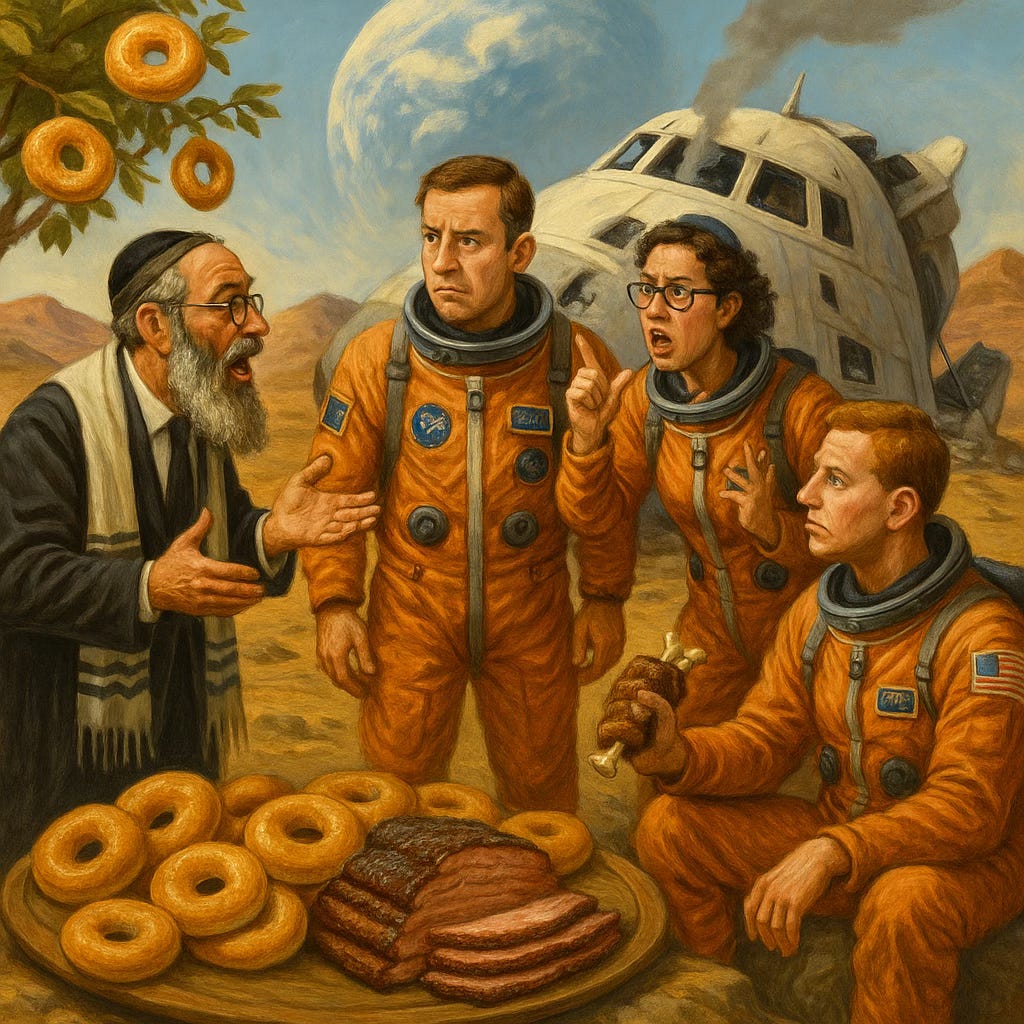Commander James Harrington had survived hurricanes, firestorms, and one very close call with a falling satellite. None of it prepared him for the sight of Lieutenant Lopez pointing through the cracked cockpit window and whispering, “Sir, are those… bagels?”
The crew of the Odyssey II had crash-landed on what sensors had pegged as an Earth-like planet, but no one had expected to see bagels growing on trees. Whole clusters of them, dangling like ripe fruit, sesame and poppy seeds glistening in the alien sun.
“Don’t touch anything until we scan it,” James ordered, though Ensign Murphy was already reaching for the cream cheese vines snaking around the trunk.
The first encounter came sooner than expected. A delegation of robed figures marched out of the forest, each one muttering in rapid-fire Hebrew, gesturing with scrolls and clipboards. At their head stood an elderly man with glasses slipping down his nose, a kippah barely clinging to his thinning hair.
“I am Rabbi-Professor Mendel Rosenblatt, Chief of Science and Halakha,” the man declared. “Welcome, visitors. Now tell me, are you kosher?”
The astronauts stared.
“Excuse me?” said James.
“Are you kosher?” Rosenblatt repeated, scribbling in his notes. “If not, we have a procedure, but it’s lengthy, requires a mikveh, a briss, and frankly, the paperwork is a nightmare.”
Before the crew could answer, they were herded into the city. It looked like Brooklyn had been stretched across a planet—men in tallitot arguing at bus stops, women juggling kugels the size of boulders, and children bartering Pokémon cards for knishes. Above it all loomed a massive billboard: “Shut Down for Yom Kippur—See You Next Year.”
Inside the council hall, twelve rabbis debated furiously about the fate of the astronauts. One wanted them deported. Another argued they should be taught the laws of kashrut first. A third, stroking his beard, suggested giving them brisket and seeing if they complained properly.
Meanwhile, Murphy whispered to Lopez, “This place runs on arguments. Nobody makes a decision, they just debate forever.”
Lopez pointed to a wall where a plaque read: The greatest honor is the fastest punchline. Below it hung portraits of comedians: Groucho Marx, Joan Rivers, Lenny Bruce, Mel Brooks, and an empty frame labeled “Next.”
Dinner was the first test. The crew was seated at a seder table that stretched for blocks. Each time James thought the meal was over, another course arrived—matzo ball soup, gefilte fish, brisket, kugel, latkes. By the twelfth blessing, the astronauts were too full to move.
“Now we sing,” declared Rosenblatt.
“I thought Passover was once a year,” groaned Murphy.
“Here it’s every night,” replied Rosenblatt. “You’ll get used to it.”
Cultural clashes grew worse. When the astronauts tried to introduce hamburgers, the entire city rioted—half because of the cheeseburgers, the other half because no one agreed on the best condiment. Football was dismissed as “too violent,” but brisket competitions drew thousands of screaming fans.
Then came the romance scandal. Lopez fell for Miriam, the rabbi’s granddaughter, after bonding over complaints about bureaucracy. Their courtship consisted of arguing over deli authenticity: Katz’s versus Carnegie, pastrami versus corned beef. The council convened emergency sessions to determine if their love was “kosher enough.”
By the third week, James realized survival meant adaptation. The astronauts trained daily in new skills:
Complaining louder than the locals.
Haggling at open-air markets until vendors cried.
Telling self-deprecating jokes with perfect timing.
Murphy discovered his gift for stand-up, earning applause with lines like, “So I asked the bagel tree, why so many seeds? And it said, ‘In case one of you astronauts forgets to floss.’”
The crew was finally accepted. They were given honorary titles—“Minyan Members at Large”—and even invited to judge the annual Fiddler on the Roof festival. Arguments over whether Topol or Zero Mostel was the true Tevye lasted three days and required emergency mediation by the United Nations of Rabbis.
At last, after months of brisket, kugel, and debate marathons, the astronauts repaired their ship. Rosenblatt wept as he blessed them. “You came to us as strangers, but you leave as family. Don’t forget to write. But not on Shabbat.”
The Odyssey II lifted off, breaking through the bagel-scented atmosphere. Cheers echoed below. The crew breathed sighs of relief.
“Finally,” said James. “Back to Earth.”
Murphy checked the navigation system, frowned, and muttered, “Uh, sir… we’ve got a problem.”
They crashed again.
This time, they stepped out onto cobblestone streets lined with espresso fountains, opera singers warming up on balconies, and mobs of grandmothers waving wooden spoons.
A banner read: Benvenuti! Planet Italia.
James buried his face in his hands. “We’re doomed.”
_ _ _
Until we meet again, let your conscience be your guide.



Funny!
I'm from the tri state area where Jews and Italians are much the same. Stuck in Phoenix, Az where I am regarded as exotic.
BUT we do have bagels that rival H&H ! Bagelfelds Bagels born of a Brooklyn born and raised caterer trying to feed his family during Covid.
Legit. Line out the door every day. Open until they sell out. Usually by 9:30
Plotzed verklempft